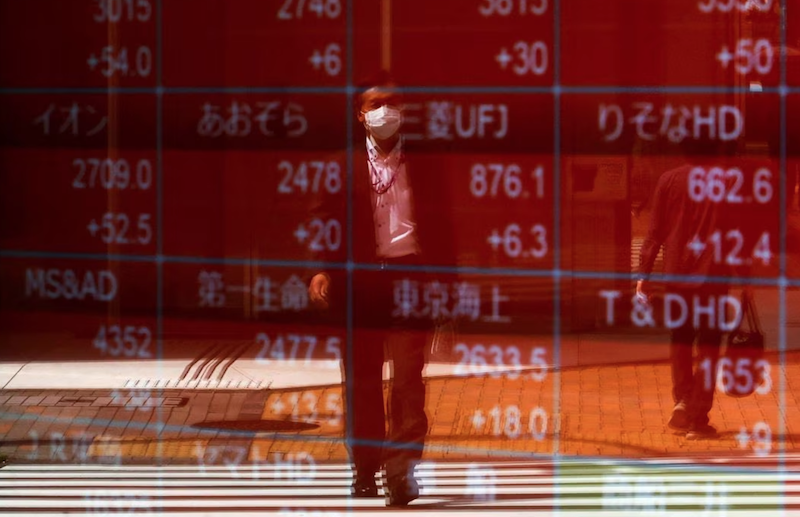Asia’s major share indexes went in different directions on Monday with some investors buoyed by soothing Sino-US tensions and hopes of imminent interest rate drops while others remained concerned about global growth prospects.
Japanese shares had earlier hit highs not seen since 1990 as strong earnings and offshore demand fuelled a three-week winning streak, while the yuan was pushed higher by China’s central bank leading to broader softness in the dollar.
But Tokyo’s benchmark Nikkei share average later reversed course to end lower as investors turned cautious about the index’s recent sharp gains.
The Nikkei share average fell 0.59%, or 197.17 points, to close at 33,388.03, while the broader Topix was down 0.77%, or 18.45 points, to 2,372.60.
Also on AF: China Not Doing Enough to Spark Property Turnaround: Analysts
Chip-related shares dragged on the Nikkei the most, with Tokyo Electron and Advantest down 0.87% and 1.55%, respectively. Automakers fell, with Toyota Motor and Honda Motor losing 3.89% and 3.78%, respectively, amid the yen’s gain against the dollar.
China stocks edged up, as signs of easing Sino-US tensions boosted investor sentiment. Last week’s meeting between US President Joe Biden and Chinese President Xi Jinping was a badly needed signal that the world needs to cooperate more, International Monetary Fund Managing Director Kristalina Georgieva said on Friday.
China’s blue-chip CSI300 Index climbed 0.23%, while the Shanghai Composite Index gained 0.46%, or 13.95 points, to 3,068.32. The Shenzhen Composite Index on China’s second exchange edged up 0.65%, or 12.53 points, to 1,936.49.
China left benchmark lending rates unchanged at a monthly fixing on Monday, matching market expectations. A lower lending rate would have helped the troubled property sector, but would have added pressure on banks as their net interest margins were already tight, analysts said.
In Hong Kong, tech stocks rallied 2.1%, with Tencent up nearly 4%. Shares of property developer Sunac China Holdings jumped as much as 11.8% after the company’s offshore debt restructuring became effective.
The Hang Seng Index gained 1.86%, or 323.88 points, to 17,778.07.
Elsewhere across the region, in earlier trade, there were also gains in Sydney, Seoul, Taipei, Bangkok, Jakarta and Wellington but Mumbai, Singapore and Manila were in the red.
MSCI’s broadest index of Asia-Pacific shares outside Japan gained 0.8%, having climbed 2.8% last week to a two-month high.
Dollar Loses Ground to Yen
Eurostoxx 50 futures held steady, while FTSE futures were a fraction firmer. S&P 500 futures eased 0.15% and Nasdaq futures lost 0.35%. The S&P is now up nearly 18% for the year and less than 2% away from its July peak.
Tech major Nvidia reports quarterly results on Tuesday and all eyes will be on the state of demand for its AI-related products.
The flow of US economic data turns to a trickle this week, but minutes of the Federal Reserve’s last meeting will offer some colour on policy makers’ thinking as they held rates steady for a second time.
Markets have all but priced out the risk of a further hike in December or next year, and imply a 30% chance of an easing starting in March. Futures also imply around 100 basis points of cuts for 2024, up from 77 basis points before the benign October inflation report shook markets.
That outlook helped bonds rally, with 10-year Treasury yields at 4.45% having dropped 19 basis points last week and away from October’s 5.02% high.
It also dragged the US dollar down almost 2% on a basket of currencies last week, and helped the euro up to $1.09365 having jumped 2.1% last week.
The dollar even lost ground to the low-yielding yen, last down 0.5% at 148.89 and short of its recent top of 151.92. Expectations of another strong wage round and of a high reading for core inflation later this week has stirred more chatter about and eventual tightening by the Bank of Japan.
In commodity markets, oil rebounded from four-month lows on Friday amid speculation OPEC+ will extend, or increase, its production cuts at a meeting on November 26. Brent added 58 cents to $81.19 a barrel, while US crude firmed 49 cents to $76.38 per barrel.
Key figures
Tokyo – Nikkei 225 < DOWN 0.59% at 33,388.03 (close)
Hong Kong – Hang Seng Index > UP 1.86% at 17,778.07 (close)
Shanghai – Composite > UP 0.46% at 3,068.32 (close)
London – FTSE 100 < DOWN 0.13% at 7,494.22 (0934 GMT)
New York – Dow > UP 0.01% at 34,947.28 (Friday close)
- Reuters with additional editing by Sean O’Meara
Read more:
Japan to Drop Quarterly Reports for Listed Businesses – Nikkei
Shock Reversal on Cloud Unit Wipes $20bn Off Alibaba Shares
Chinese Yuan Passes Euro to be the Second Top Trade Currency
Tech Fears Spark Hang Seng Slide, Earnings Boost Nikkei























